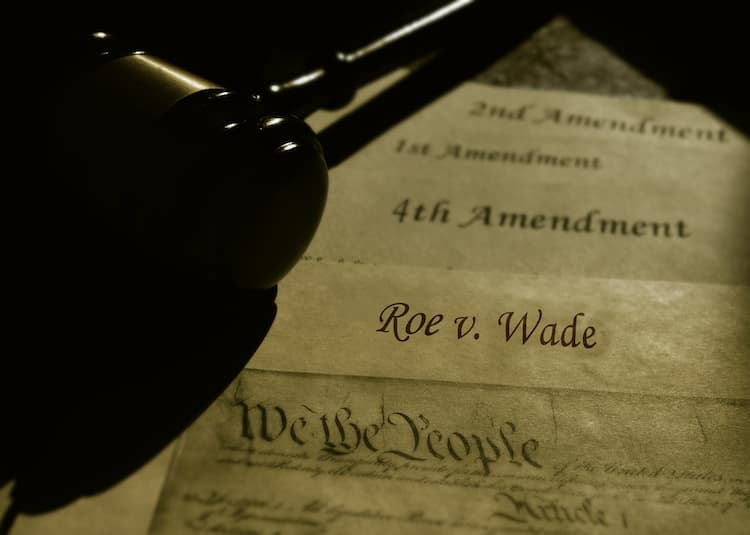Abortion Returns to SCOTUS in December with Challenge to Roe v Wade

Early next month, the U.S. Supreme Court is scheduled to hear oral arguments in Dobbs v. Jackson Women’s Health Organization, which involves a Mississippi law that makes most abortions illegal after 15 weeks of pregnancy. Given that the state has expressly asked the Court to overturn its landmark decisions in Roe v. Wade, 410 U.S. 113 (1973), and Planned Parenthood v. Casey, 505 U.S. 833 (1992), the closely-watched case is poised to determine how the Court’s new conservative majority will address abortion rights going forward.
Mississippi Abortion Law
On March 19, 2018, Mississippi enacted the “Gestational Age Act” (Act). The Act provides that, in most cases, an abortion cannot be performed until a physician first determines and documents a fetus’s probable gestational age. Then, [e]xcept in a medical emergency or in the case of a severe fetal abnormality, a person shall not perform, induce, or attempt to perform or induce an abortion of an unborn human being if the probable gestational age of the unborn human being has been determined to be greater than fifteen (15) weeks.”
On the day the Act was signed into law, Jackson Women’s Health Organization, the only licensed abortion facility in Mississippi, and one of its doctors, Dr. Sacheen Carr-Ellis (collectively “the Clinic”), filed suit challenging the Act and requesting an emergency temporary restraining order. The district court granted summary judgment to the Clinic. The Act was unconstitutional, the court held, because “viability marks the earliest point at which the State’s interest in fetal life is constitutionally adequate to justify a legislative ban on nontherapeutic abortions.”
In support of its decision, the district court cited both Roe and Casey. In Roe, the Supreme Court held that the right to privacy “is broad enough to encompass a woman’s decision whether or not to terminate her pregnancy.” Meanwhile, Casey reaffirmed the Supreme Court’s “recognition of the right of the woman to choose to have an abortion before viability and to obtain it without undue interference from the State.” As the Supreme Court explained, “Before viability, the State’s interests are not strong enough to support a prohibition of abortion or the imposition of a substantial obstacle to the woman’s effective right to elect the procedure.”
Fifth Circuit’s Decision
The Fifth Circuit Court of Appeals affirmed, also citing the Supreme Court’s long-standing precedent on abortion. “With respect to bans like this one, the Supreme Court’s viability framework has already balanced the State’s asserted interests and found them wanting: Until viability, it is for the woman, not the state, to weigh any risks to maternal health and to consider personal values and beliefs in deciding whether to have an abortion,” the court wrote.
On appeal, the State had argued that the district court should have considered whether the Act “place[s] a substantial obstacle in the path of a woman seeking an abortion before the fetus attains viability[.]” According to the State, under this analysis, the Act “would likely be upheld, since it allows women up to three and a half months to decide whether to have an abortion.”
The Fifth Circuit rejected the argument, concluding that the Act still runs afoul of the Supreme Court’s decision in Casey by banning pre-viability abortions. “These arguments do not save the Act from encroaching on the holding of Casey,” the court wrote. “The Act pegs the availability of abortions to a specific gestational age that undisputedly prevents the abortions of some non-viable fetuses. It is a prohibition on pre-viability abortion.”
Issues Before the Supreme Court
The Supreme Court granted certiorari on May 17, 2021. The justices have agreed to consider the following question: “Whether all pre-viability prohibitions on elective abortions are unconstitutional.”
Oral arguments are scheduled for December 1, 2021, and a decision is expected before the term ends in June 2022.
Previous Articles
Justices Skeptical of Trump Administration Tariffs
by DONALD SCARINCI on December 18, 2025
The U.S. Supreme Court heard oral arguments in Learning Resources, Inc. v. Trump (consolidated with...
SCOTUS Takes Up Key Election Case Involving Mail-In Ballots
by DONALD SCARINCI on December 17, 2025
The U.S. Supreme Court recently granted certiorari in a key election case, Watson v. Republican Nat...
SCOTUS Adds Second Amendment Case to Docket
by DONALD SCARINCI on November 27, 2025
The U.S. Supreme Court will consider another important Second Amendment case this term. The latest ...
The Amendments
-
Amendment1
- Establishment ClauseFree Exercise Clause
- Freedom of Speech
- Freedoms of Press
- Freedom of Assembly, and Petitition
-
Amendment2
- The Right to Bear Arms
-
Amendment4
- Unreasonable Searches and Seizures
-
Amendment5
- Due Process
- Eminent Domain
- Rights of Criminal Defendants
Preamble to the Bill of Rights
Congress of the United States begun and held at the City of New-York, on Wednesday the fourth of March, one thousand seven hundred and eighty nine.
THE Conventions of a number of the States, having at the time of their adopting the Constitution, expressed a desire, in order to prevent misconstruction or abuse of its powers, that further declaratory and restrictive clauses should be added: And as extending the ground of public confidence in the Government, will best ensure the beneficent ends of its institution.





